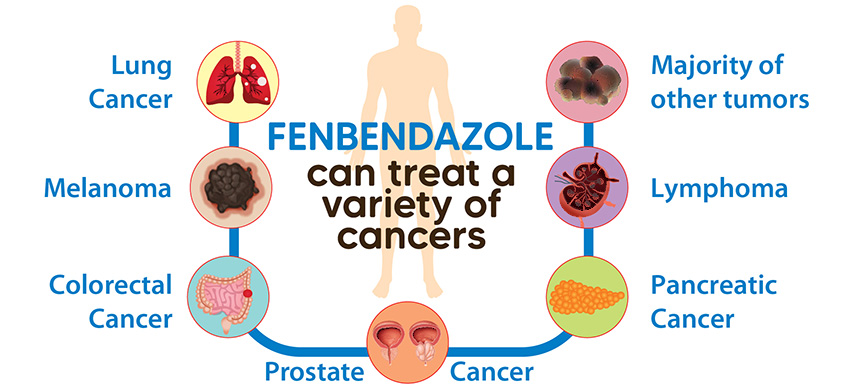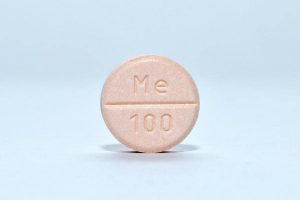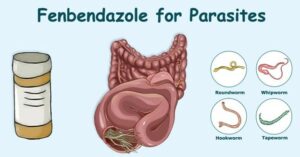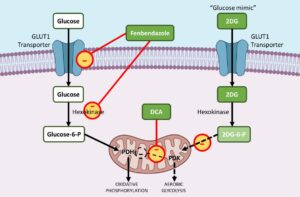Utilised as a remedy for parasitic worm infections in dogs, fenbendazole is an anthelmintic drug that has been in circulation since the early 1970s. (Source)
However, in more recent years there have been numerous published and peer reviewed papers with case reports proving that fenbendazole is also very effective in the treatment of some aggressive cancers in humans. This is believed to be because of the following various strong points that distinguish fenbendazole from other cancer fighting treatments:
- There are a significant number of scientific publications that support and substantiate its effective use in treating some aggressive cancers in humans. (Source)
- It has been reported that Fenbendazole alone is an effective treatment for causing the regression of tumors in patients with diffuse large B-cell lymphoma, metastatic cancer, renal cell carcinoma, and bladder cancer. Fenbendazole has shown promise as a potential treatment for many forms of cancer. (Source1),(Source2)
- Fenbendazole has very few side effects and is very safe for humans to use.
- It is available over-the-counter in many countries.
- It is extremely inexpensive to produce.
Moreover, in our article How fenbendazole works? we reported that the fenbendazole anticancer action is very similar to the plant alkaloids group of chemotherapies to which the anticancer therapy Taxol belongs. Furthermore, due to the unique way it works and its exceptional safety profile, fenbendazole’s toxicity levels are far lower than those seen in conventional chemotherapies.
Through many observations and findings, it has become apparent (with the emergence of certain patterns) that the origin of some cancers may be related to and triggered by viruses, parasites, and the like.
In fact, it’s possible that this is the case in many more instances than we are aware of, especially if the cancer cells find themselves in “fertile ground”, represented by compromised immunity combined with specific genetic predilections.
Therefore, we seriously consider the use of anti-parasitic, anti-worm, anti-lactate and other drugs as part of a comprehensive cancer treatment approach that can also include the use of conventional cancer therapies.

Fenbendazole for humans
Fenbendazole is not a drug that is habitually used in the treatment of humans, like mebendazole. Typically used in cases of animals (including mammals, birds, and fish) with parasites, fenbendazole is known to kill numerous parasitic worms such as whip worm, hookworm, some tape worms, and roundworm.
Found under brand names such as Panacur or Safe-Guard, fenbendazole was first brought to our attention in relation to the treatment of cancer years ago through our own research. However, more recently it has captured our attention again through the renowned story of a man who successfully treated his small cell lung cancer with the anti-worm drug.
Since then, a dedicated website and a Facebook group serve as a platform to chronicle his own experience, as well as the experience of other patients who are experiencing the benefits of using Fenbendazole in treating cancers such as non-small cell lung cancer, melanoma, colorectal cancer, prostate cancer, stage four pancreatic cancer and other types.
These recent reports only go further to help support the existing and mounting scientific evidence that demonstrates the cancer fighting potential linked to numerous drugs in the benzimidazole class of compounds. Due to this, we are of the opinion and belief that, like mebendazole, fenbendazole for humans is displaying a significant cancer fighting potential.

In fact, there are some studies where fenbendazole has proved to be more efficacious than mebendazole. E.g., in one such study fenbendazole was demonstrated to be much more successful than mebendazole and other drugs in fighting Cryptococcus neoformans – an opportunistic fungus which can be found anywhere in the world and may cause Cryptococcus meningitis in some people. (Source)
Furthermore, of the many scientific articles that have been published and suggested that Fenbendazole demonstrates cancer fighting properties, this paper, Fenbendazole acts as a moderate microtubule destabilizing agent and causes cancer cell death by modulating multiple cellular pathways, determined that:
- “The results, in conjunction with our earlier data, suggest that Fenbendazole is a new microtubule interfering agent that displays anti-neoplastic activity and may be evaluated as a potential therapeutic agent because of its effect on multiple cellular pathways leading to the effective elimination of cancer cells.”
The authors of this paper concluded that fenbendazole’s cancer fighting mechanisms not only disrupted the proteasomal interference and microtubule function of cancer cells, but also showed an ability to block glucose uptake, inherently starving the cancer cells. Fenbendazole reduced the expression of glucose transporter isoform 4 (GLUT4). Stimulation of glucose uptake in cells through insulin moves GLUT4 through the intracellular vesicles to the plasma membrane, ready to absorb glucose. By disrupting its linear movement through the microtubule with fenbendazole, GLUT4 movements are inhibited, which greatly reduces insulin-stimulated sugar uptake. (Source)
Moreover, as fenbendazole works similarly to colchicine (interacting with a site on tubulin) yet is distinctly different from other vinca alkaloids, it will not compete with them or other chemotherapies. Instead, as is the case with other benzimidazole compounds, fenbendazole will enhance the anti-cancer effects of other cancer therapies, such as surgery, radiotherapy, sodium dichloroacetate (DCA), berberine etc. (Source)
Adding to this, a recently published scientific paper proposes that fenbendazole (and similar drugs) can potentially reactivate genome p53. Functioning as a tumor suppressor, p53 is known as the Guardian of the Genome. However, its suppression ability can be inhibited in some cancers. (Source)
Furthermore, the Nature paper goes on to cite that fenbendazole was very effective when combined with DCA.

Fenbendazole for humans – is it good fit for human consumption?
Although fenbendazole is ordinarily and originally used for the treatment of parasitic worms in animals, a report available at the European Medicine Agency states, “Fenbendazole seems to be well tolerated in humans after oral exposure (single oral dose up to 2,000 mg/per person: 500 mg/per person for 10 consecutive days)”. (Source)
However, long exposure has not yet been scientifically documented. This most likely is due to the nature of the drug – the parasitic infections are usually eradicated in no longer than 1-2 weeks.
Despite that, many people have taken fenbendazole daily for years as a prophylaxis to prevent cancer recurrence or as an active treatment against their tumors. The treatment appears to be safe and it rarely, if ever, causes any side-effects.
Final Note
Thank you for visiting us and taking the time to read this article. If you are in search of more valuable insights and information regarding fenbendazole, please check out the rest of the information we have to offer across our site.
If you’re exploring for more options that are compatible with the Fenbendazole protocol, you might want to check out DCA, a metabolic anti-cancer treatment strategy that can be used standalone or in combination with fenbendazole: https://www.dcaguide.org/.



